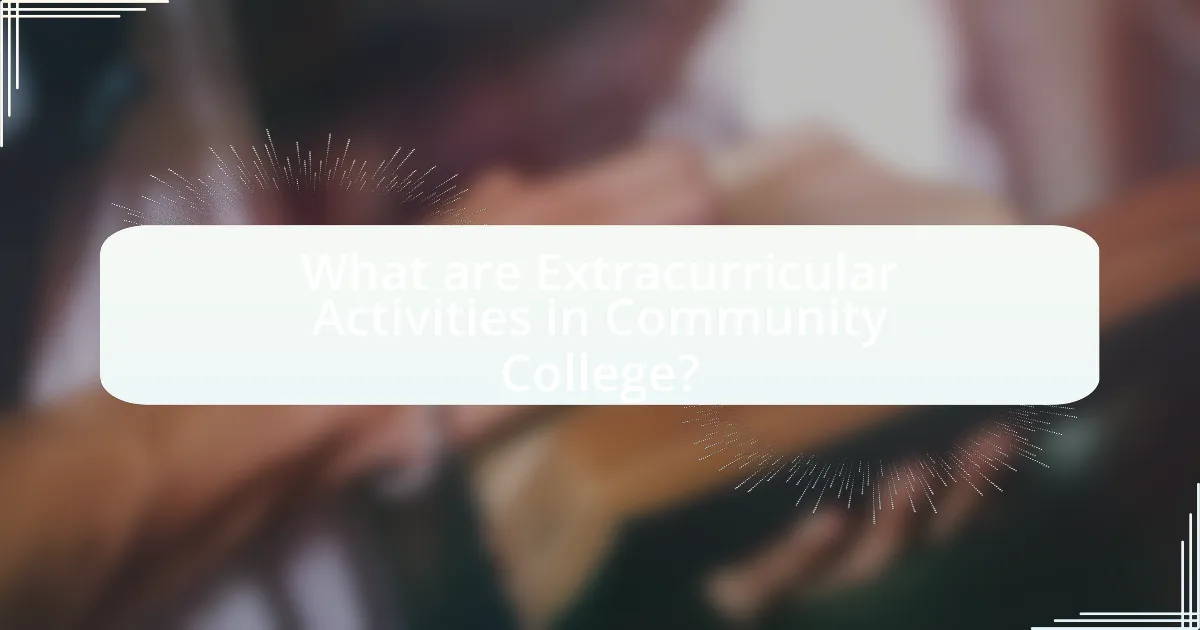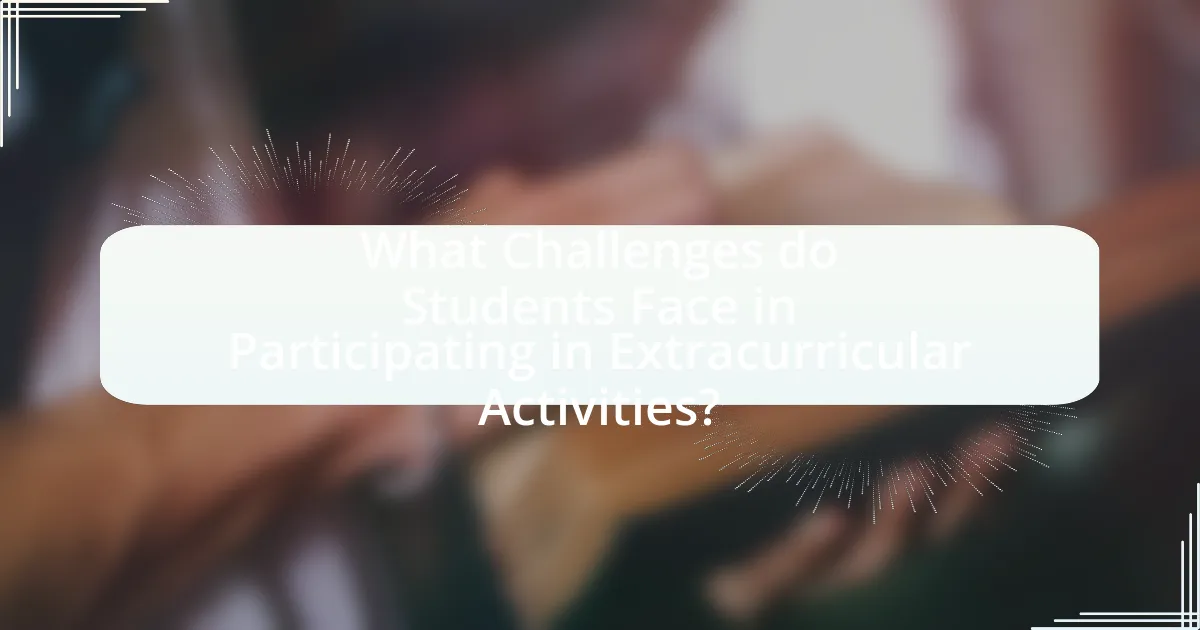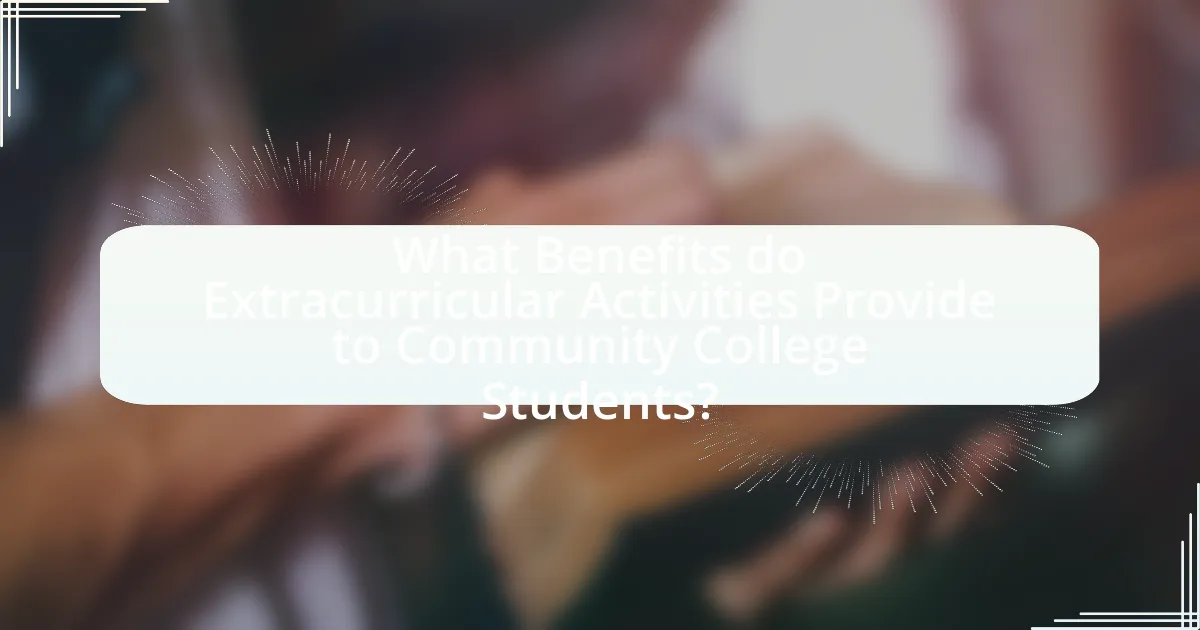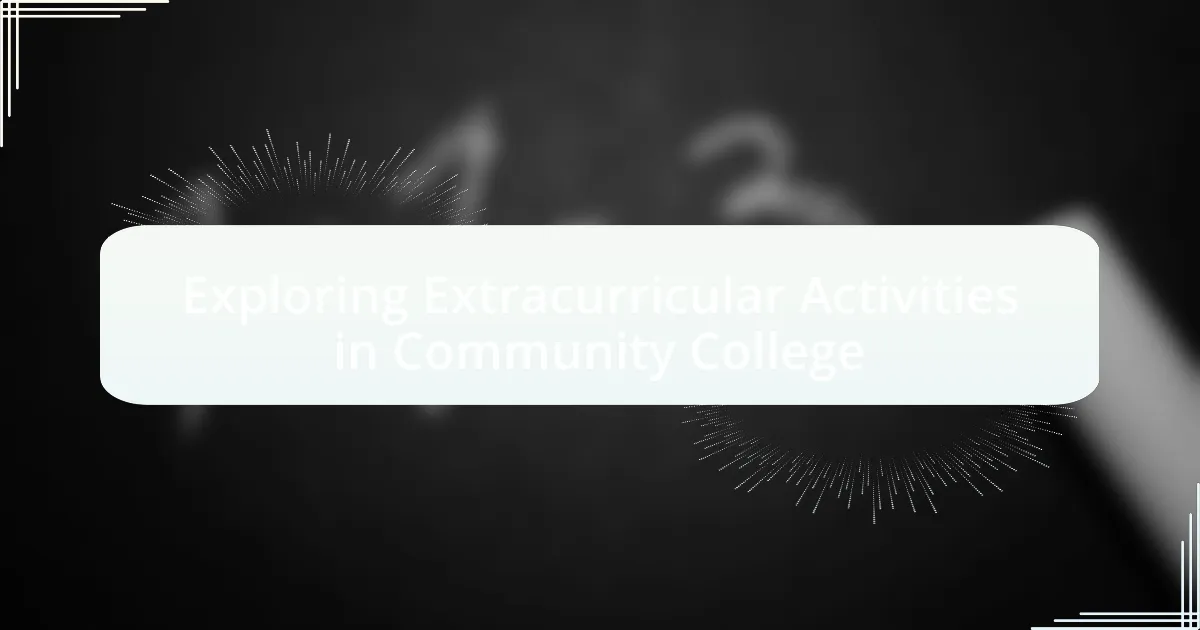Extracurricular activities in community college encompass organized programs and events outside the academic curriculum, aimed at enhancing students’ educational experiences and personal growth. These activities, including student clubs, sports teams, and volunteer opportunities, are crucial for fostering social connections, skill development, and community engagement. Research indicates that participation in these activities correlates with improved academic performance and higher retention rates among students. The article explores the importance of extracurricular activities, the types available, the benefits they provide, and the challenges students may face in getting involved, while also offering strategies for maximizing participation and leveraging these experiences for career development.

What are Extracurricular Activities in Community College?
Extracurricular activities in community college are organized programs and events that occur outside of the academic curriculum, designed to enhance students’ educational experience and personal development. These activities include student clubs, sports teams, volunteer opportunities, cultural events, and leadership programs, which foster social interaction, skill development, and community engagement. Research indicates that participation in extracurricular activities can lead to improved academic performance and increased student retention rates, as students who engage in such activities often feel more connected to their institution and peers.
Why are Extracurricular Activities Important for Community College Students?
Extracurricular activities are important for community college students because they enhance personal development, foster social connections, and improve academic performance. Participation in these activities allows students to develop essential skills such as leadership, teamwork, and time management, which are crucial for both academic success and future employment. Research indicates that students involved in extracurricular activities tend to have higher GPAs and are more likely to persist in their studies, as evidenced by a study published in the Journal of College Student Development, which found that engagement in such activities positively correlates with academic achievement and retention rates.
How do Extracurricular Activities Enhance Academic Performance?
Extracurricular activities enhance academic performance by fostering skills such as time management, teamwork, and leadership. Participation in these activities encourages students to develop a balanced approach to their studies and personal interests, which can lead to improved focus and motivation in academic settings. Research conducted by the National Center for Education Statistics indicates that students involved in extracurricular activities tend to have higher GPAs and lower dropout rates compared to their peers who do not participate. This correlation suggests that the skills and social networks gained through extracurricular involvement contribute positively to academic success.
What Role do Extracurricular Activities Play in Personal Development?
Extracurricular activities play a crucial role in personal development by enhancing skills such as leadership, teamwork, and time management. Participation in these activities allows individuals to engage in diverse experiences that foster social connections and improve self-esteem. Research indicates that students involved in extracurricular activities are more likely to develop a sense of belonging and community, which contributes to their overall well-being. For instance, a study published in the Journal of Educational Psychology found that students who participated in clubs and organizations reported higher levels of academic motivation and personal growth compared to their peers who did not engage in such activities.
What Types of Extracurricular Activities are Available in Community Colleges?
Community colleges offer a variety of extracurricular activities, including student government, clubs and organizations, sports teams, cultural events, and volunteer opportunities. These activities provide students with avenues for leadership, social interaction, and personal development. For instance, many community colleges have student government associations that allow students to participate in decision-making processes and represent their peers. Additionally, clubs focused on academic interests, hobbies, or cultural backgrounds foster community engagement and networking. Sports teams promote physical fitness and teamwork, while volunteer opportunities encourage civic responsibility and community service. According to the American Association of Community Colleges, participation in extracurricular activities is linked to higher student retention and success rates, highlighting their importance in the community college experience.
What are the Most Common Clubs and Organizations?
The most common clubs and organizations in community colleges include student government associations, academic clubs, cultural organizations, and recreational sports teams. Student government associations provide a platform for students to voice their opinions and participate in governance, while academic clubs focus on specific fields of study, enhancing learning and networking opportunities. Cultural organizations celebrate diversity and promote cultural awareness, and recreational sports teams offer physical activity and team-building experiences. According to the National Center for Education Statistics, over 50% of community college students participate in extracurricular activities, highlighting the significance of these clubs and organizations in fostering student engagement and community.
How do Sports and Recreation Programs Contribute to Student Life?
Sports and recreation programs significantly enhance student life by promoting physical health, social interaction, and community engagement. These programs provide students with opportunities to participate in team sports and recreational activities, which can lead to improved physical fitness and mental well-being. Research indicates that students involved in sports are more likely to report higher levels of satisfaction with their college experience, as these activities foster friendships and a sense of belonging. Additionally, participation in sports can improve academic performance; a study published in the Journal of American College Health found that students who engage in physical activities tend to have better grades and higher retention rates. Overall, sports and recreation programs are vital components of student life, contributing to holistic development and a supportive campus environment.
How Can Students Get Involved in Extracurricular Activities?
Students can get involved in extracurricular activities by joining clubs, participating in sports, or engaging in community service programs offered by their community college. Many colleges provide a variety of student organizations that cater to diverse interests, such as academic clubs, cultural groups, and recreational teams. According to the National Center for Education Statistics, approximately 70% of community college students participate in at least one extracurricular activity, which enhances their social skills and academic performance. By attending orientation events or checking the college’s student life webpage, students can discover available opportunities and connect with peers who share similar interests.
What Steps Should Students Take to Join Clubs and Organizations?
Students should first research available clubs and organizations at their community college. This involves visiting the college’s website or student affairs office to find a list of active groups. Next, students should attend club fairs or informational meetings to learn more about each organization’s mission and activities. After identifying clubs of interest, students should reach out to club leaders or members to express their desire to join and inquire about membership requirements. Finally, students should complete any necessary registration forms or attend initial meetings to officially become a member. Engaging in these steps allows students to connect with peers and enhance their college experience through extracurricular involvement.
How Can Students Create Their Own Extracurricular Groups?
Students can create their own extracurricular groups by identifying a common interest, gathering interested peers, and submitting a proposal to the college administration for approval. This process typically involves outlining the group’s purpose, planned activities, and how it will benefit the student community. Many community colleges have specific guidelines and resources available to assist students in forming these groups, ensuring they align with institutional policies and support student engagement. For instance, a study by the American Association of Community Colleges highlights that student-led organizations enhance campus involvement and foster a sense of belonging among students.

What Challenges do Students Face in Participating in Extracurricular Activities?
Students face several challenges in participating in extracurricular activities, including time constraints, financial limitations, and lack of awareness. Time constraints arise from balancing academic responsibilities, work commitments, and personal obligations, making it difficult for students to engage fully in activities. Financial limitations can restrict participation, as some extracurriculars may require fees for materials, travel, or events. Additionally, a lack of awareness about available opportunities can prevent students from getting involved, as they may not receive adequate information about the activities offered. These challenges collectively hinder student engagement in extracurricular activities, impacting their overall college experience.
How do Time Management Issues Affect Participation?
Time management issues significantly reduce participation in extracurricular activities at community colleges. When students struggle to allocate their time effectively, they often prioritize academic responsibilities over extracurricular involvement, leading to decreased engagement. Research indicates that students who manage their time poorly are less likely to participate in activities that enhance their social and professional skills, as they may feel overwhelmed or lack the necessary time to commit. For instance, a study published in the Journal of College Student Development found that students with effective time management skills reported higher levels of involvement in campus activities, highlighting the direct correlation between time management and participation rates.
What Strategies Can Students Use to Balance Academics and Extracurriculars?
Students can balance academics and extracurriculars by implementing effective time management strategies. Prioritizing tasks through a planner or digital calendar allows students to allocate specific time slots for studying, attending classes, and participating in extracurricular activities. Research indicates that students who use time management techniques report higher academic performance and lower stress levels (Britton & Tesser, 1991). Additionally, setting clear goals for both academic and extracurricular commitments helps students maintain focus and motivation, ensuring that neither area is neglected. Regularly assessing and adjusting their schedules based on workload and commitments further enhances their ability to balance these responsibilities effectively.
How Can Students Overcome Financial Barriers to Participation?
Students can overcome financial barriers to participation by seeking scholarships, grants, and financial aid specifically designed for extracurricular activities. Many community colleges offer funding opportunities that can cover costs associated with clubs, sports, and events. For instance, the American Association of Community Colleges reports that over 60% of community colleges provide some form of financial assistance for student activities. Additionally, students can engage in fundraising efforts or collaborate with local businesses for sponsorships, which can alleviate costs. By utilizing these resources, students can enhance their participation in extracurricular activities without the burden of financial constraints.
What Social Barriers Might Students Encounter?
Students may encounter social barriers such as lack of social integration, cultural differences, and limited access to networks. These barriers can hinder their participation in extracurricular activities, which are crucial for building relationships and enhancing the college experience. Research indicates that students from diverse backgrounds often feel isolated due to cultural misunderstandings or a lack of representation in student organizations, leading to decreased engagement (Hurtado & Carter, 1997). Additionally, students with limited social networks may struggle to find opportunities for involvement, which can further exacerbate feelings of exclusion and impact their overall academic success.
How Can Students Build Connections and Overcome Social Anxiety?
Students can build connections and overcome social anxiety by actively participating in extracurricular activities at community college. Engaging in clubs, sports, or volunteer opportunities provides structured environments where students can meet peers with similar interests, fostering social interactions. Research indicates that involvement in such activities enhances social skills and reduces feelings of isolation, as students often report increased confidence and a sense of belonging. For instance, a study published in the Journal of College Student Development found that students who participated in extracurricular activities experienced lower levels of anxiety and improved social networks.
What Resources are Available for Students Seeking Support?
Students seeking support in community college can access various resources, including counseling services, academic advising, tutoring centers, and student organizations. Counseling services provide mental health support and guidance, while academic advising helps students navigate their educational paths. Tutoring centers offer assistance in specific subjects, enhancing academic performance. Additionally, student organizations foster community and provide networking opportunities, contributing to personal and professional development. These resources are essential for promoting student success and well-being in the community college environment.

What Benefits do Extracurricular Activities Provide to Community College Students?
Extracurricular activities provide community college students with enhanced social skills, improved academic performance, and increased career opportunities. Participation in these activities fosters a sense of belonging and community, which is crucial for student retention; studies show that students involved in extracurriculars are 20% more likely to persist in their studies. Additionally, engagement in clubs and organizations helps students develop leadership and teamwork skills, which are highly valued by employers. Research indicates that students who participate in extracurricular activities often achieve higher GPAs, as these activities encourage time management and discipline.
How do Extracurricular Activities Foster Networking Opportunities?
Extracurricular activities foster networking opportunities by providing platforms for students to connect with peers, faculty, and industry professionals. Participation in clubs, organizations, and events allows individuals to build relationships based on shared interests and goals, which can lead to mentorship and collaboration. For instance, a study by the National Association of Colleges and Employers found that 85% of jobs are filled through networking, highlighting the importance of these connections formed in extracurricular settings. Additionally, engaging in activities such as student government or professional associations can enhance visibility and credibility, further expanding one’s professional network.
What Impact do Networking Opportunities Have on Career Development?
Networking opportunities significantly enhance career development by facilitating connections that can lead to job placements, mentorship, and professional growth. Engaging in networking allows individuals to build relationships with industry professionals, which can result in access to unadvertised job openings; studies indicate that up to 70% of jobs are found through networking. Additionally, networking can provide valuable insights into industry trends and best practices, further equipping individuals for career advancement.
How Can Students Leverage Extracurricular Involvement for Job Applications?
Students can leverage extracurricular involvement for job applications by highlighting skills and experiences gained through these activities. Participation in clubs, sports, or volunteer work demonstrates teamwork, leadership, and time management, which are highly valued by employers. For instance, a study by the National Association of Colleges and Employers found that 80% of employers seek candidates with strong interpersonal skills, often developed through extracurricular activities. Additionally, students can use specific examples from their involvement to illustrate their problem-solving abilities and commitment, making their applications more compelling.
What Skills Can Students Develop Through Extracurricular Activities?
Students can develop a variety of skills through extracurricular activities, including leadership, teamwork, time management, and communication. Participation in clubs, sports, and volunteer work fosters leadership abilities as students take on roles that require decision-making and responsibility. Teamwork is enhanced through collaborative projects and group activities, where students learn to work effectively with others towards common goals. Time management skills are cultivated as students balance academic responsibilities with extracurricular commitments, teaching them to prioritize tasks and manage their schedules efficiently. Additionally, communication skills are improved through presentations, discussions, and networking opportunities that arise in these activities. Research indicates that students involved in extracurricular activities often demonstrate higher levels of engagement and academic performance, reinforcing the value of these experiences in skill development.
How do Leadership Roles in Clubs Enhance Skill Sets?
Leadership roles in clubs enhance skill sets by providing opportunities for individuals to develop critical competencies such as communication, teamwork, and problem-solving. Engaging in leadership positions requires members to organize events, delegate tasks, and motivate peers, which directly contributes to their ability to manage projects effectively. Research indicates that students who take on leadership roles in extracurricular activities report improved self-efficacy and enhanced interpersonal skills, as evidenced by a study published in the Journal of College Student Development, which found that 70% of student leaders felt more prepared for future professional roles due to their experiences in clubs.
What Soft Skills are Gained from Team Sports and Group Activities?
Team sports and group activities foster essential soft skills such as teamwork, communication, leadership, and problem-solving. Participation in these activities requires individuals to collaborate towards common goals, enhancing their ability to work effectively with others. Research indicates that 70% of employers value teamwork skills, highlighting the importance of collaboration in the workplace. Additionally, engaging in team sports improves communication skills as players must convey strategies and feedback clearly. Leadership skills are also developed, as individuals often take turns leading their teams or guiding peers. Furthermore, problem-solving abilities are sharpened through the need to strategize and adapt during games, making participants more adept at handling challenges.
What are Best Practices for Maximizing Involvement in Extracurricular Activities?
To maximize involvement in extracurricular activities, students should actively seek opportunities that align with their interests and goals. Engaging in activities that resonate personally increases motivation and commitment. Research indicates that students who participate in extracurricular activities are more likely to develop leadership skills, enhance their social networks, and improve academic performance. For instance, a study published in the Journal of Educational Psychology found that students involved in clubs and organizations reported higher levels of satisfaction and engagement in their college experience. Additionally, maintaining a balanced schedule that allows time for both academics and extracurriculars is crucial for sustained involvement.
How Can Students Effectively Choose Activities that Align with Their Goals?
Students can effectively choose activities that align with their goals by first identifying their personal and academic objectives. This involves self-reflection to clarify what skills they want to develop, what interests they wish to pursue, and how these activities can enhance their career prospects. Research indicates that students who engage in extracurricular activities related to their field of study are more likely to gain relevant experience and networking opportunities, which can lead to better job placements post-graduation. For instance, a study published in the Journal of College Student Development found that students involved in activities aligned with their career goals reported higher levels of satisfaction and success in their professional lives. Therefore, by assessing their goals and selecting activities that directly support those objectives, students can maximize their educational experience and future career potential.
What Tips Can Help Students Stay Engaged and Motivated?
To help students stay engaged and motivated, participating in extracurricular activities is essential. Engaging in clubs, sports, or volunteer opportunities fosters a sense of community and belonging, which can enhance motivation. Research indicates that students involved in extracurricular activities are more likely to have higher academic performance and better social skills, as shown in a study published in the Journal of Educational Psychology, which found that students who participate in such activities report increased motivation and engagement in their studies. Additionally, setting personal goals and seeking mentorship within these activities can further boost motivation and commitment.

Leave a Reply